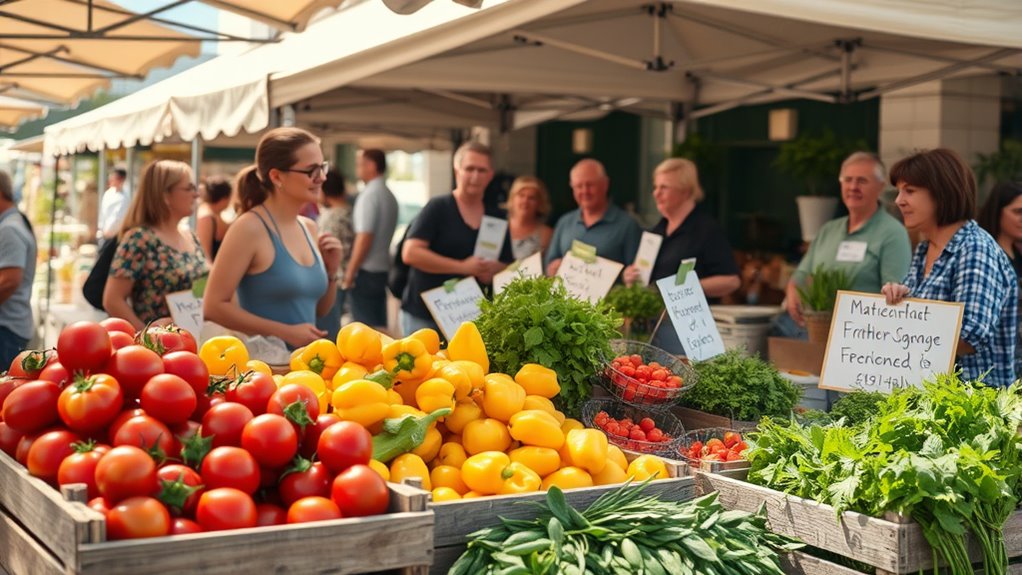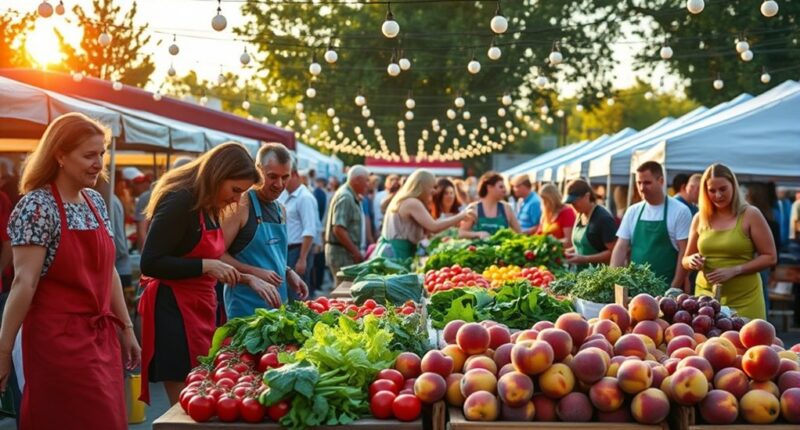Buying local at farmers’ markets directly connects you with producers, fostering stronger community ties and supporting small businesses. When you shop this way, more money stays within the community, boosting the local economy and encouraging sustainable practices. Your choices help farmers grow and hire more workers, creating a ripple effect of economic growth. If you want to discover how your support can further strengthen your local economy, keep exploring these positive impacts.
Key Takeaways
- Farmers’ markets shorten supply chains, keeping more money within the local community and supporting small businesses.
- Buying directly from farmers fosters community loyalty and strengthens local social connections.
- Increased demand encourages farmers to expand, hire more workers, and invest in community infrastructure.
- Supporting local producers promotes sustainable practices, organic farming, and environmental conservation.
- Consumer participation boosts local economic resilience, diversifies the economy, and enhances community well-being.

Have you ever wondered how farmers’ markets impact local economies? When you choose to shop at these markets, you’re not just buying fresh produce; you’re actively shaping the community’s economic landscape. Farmers’ markets create a shorter, more direct supply chain by connecting local growers directly with consumers like you. This streamlined process reduces the layers of middlemen typically involved in traditional grocery stores, meaning more money stays within the community. As a result, farmers receive a fairer price for their goods, and your dollar goes further in supporting local agriculture. The efficiency of this supply chain often leads to fresher products, which encourages you to buy more seasonal and locally sourced foods, reinforcing a cycle that benefits everyone involved. Additionally, the contrast ratio in how efficiently the community allocates resources plays a role in the overall economic health of local markets.
Your consumer behavior plays a pivotal role in strengthening the local economy through farmers’ markets. When you opt to purchase directly from local farmers, you’re making a conscious decision that impacts the entire community. Your support fosters a sense of community resilience, as more money circulates locally rather than being siphoned off to large corporations and distant suppliers. This shift in purchasing habits not only benefits farmers financially but also promotes sustainable practices, such as organic farming and conservation efforts. As you become more aware of where your food comes from, you’re more likely to prioritize quality over quantity, which encourages farmers to produce higher-quality goods that meet your expectations.
Choosing local farmers supports community resilience and sustainable practices while ensuring higher-quality, fresh produce.
Furthermore, your participation influences consumer behavior on a broader scale. When you frequent farmers’ markets, you set a precedent that values local, fresh, and sustainably grown products. This can inspire neighboring consumers to follow suit, creating a ripple effect that boosts overall local demand. Increased demand can lead farmers to expand their operations, hire more workers, and invest in better infrastructure, all of which contribute to economic growth within the community. Additionally, farmers’ markets often support small businesses and artisans, diversifying the local economy and encouraging entrepreneurship.
Your choices at farmers’ markets also impact the community’s social fabric. As you engage directly with farmers, you gain insights into their practices and the challenges they face, fostering a sense of connection and shared purpose. This relationship-building can lead to increased trust and loyalty, ensuring the market’s sustainability for years to come. Ultimately, your consumer behavior at farmers’ markets doesn’t just influence what’s on your plate; it helps create a resilient, vibrant local economy that benefits everyone involved. By shopping locally, you’re part of a cycle that promotes economic stability, sustainability, and community well-being.
Frequently Asked Questions
How Do Farmers’ Markets Impact Local Real Estate Values?
Farmers’ markets can boost local real estate values by enhancing neighborhood appeal and attracting new residents. When you visit these markets, you help create a vibrant, lively community that attracts potential buyers. This property uplift, driven by increased foot traffic and a stronger sense of community, makes the area more desirable. As a result, local homes often see an increase in value, benefiting homeowners and encouraging further neighborhood development.
What Are the Environmental Benefits of Buying Local at Farmers’ Markets?
When you buy local at farmers’ markets, you support sustainable agriculture practices that reduce transportation emissions and energy use. This choice helps conserve biodiversity by encouraging diverse crop varieties and organic farming methods. By choosing local, you minimize your carbon footprint, promote healthier ecosystems, and contribute to environmental conservation. Your support fosters resilient local food systems that prioritize eco-friendly methods, making a positive impact on the planet and ensuring a sustainable future.
How Do Farmers’ Markets Influence Local Employment Rates?
Imagine a farmers’ market opening in your town, creating new stalls and attracting visitors. This boosts local job creation, with more people needed for setup, sales, and maintenance. As demand grows, wages tend to increase, supporting workers and their families. By supporting these markets, you help stimulate employment opportunities, contributing to wage growth and strengthening the community’s economy. Your patronage directly impacts local employment rates positively.
Are There Health Benefits Associated With Purchasing From Farmers’ Markets?
When you buy from farmers’ markets, you enjoy nutritional advantages like fresher, less processed produce. This can lead to dietary improvements, helping you make healthier choices. Farmers’ markets often offer seasonal, locally grown foods that retain more nutrients. By opting for these options, you support better health and nutrition, making it easier to incorporate wholesome foods into your daily routine.
What Challenges Do Farmers’ Markets Face in Expanding Their Reach?
You might think farmers’ markets could conquer the world, but seasonal limitations restrict their year-round presence, making consistent growth a challenge. Vendor recruitment also feels like trying to catch lightning in a bottle—difficult and unpredictable. These hurdles hinder expansion efforts, limiting access for new customers and vendors alike. Overcoming seasonal constraints and attracting diverse vendors are essential steps to help farmers’ markets grow beyond their current boundaries.
Conclusion
As you walk through a farmers’ market, you feel the warmth of community in every vibrant stall and fresh aroma. Your choice to buy local isn’t just a transaction; it’s planting seeds for a stronger, more resilient neighborhood. Each fruit, vegetable, and handmade craft fuels local economies and nurtures connections. When you shop here, you’re not just nourishing your body—you’re helping your community bloom and thrive, one fresh, colorful bite at a time.









